Georgia Grown Produce
July 17, 2019 | 16 min to read
Georgia, known as the Peach State, excels in producing a wide array of fruits and vegetables, shipping over 40 items, including peanuts, peaches, and blueberries, throughout the U.S. Its diverse soil types and temperate climate promote high-quality produce, enhancing Georgia's reputation as a leading agricultural state. The Georgia Grown program fosters local pride and supports the economy, while the state’s strategic location enables quick distribution to major markets, ensuring fresh products year-round and satisfying consumer demand for local produce.

Southern Hub For Crop Diversity Keeps Fresh Product On Shelves Nearly Year-Round.
Widely known as the Peach State, Georgia produces a bounty of fruits and vegetables that far exceed the tasty peaches and Vidalia sweet onions.
Georgia grows more than 40 items that are shipped to buyers throughout the Northeast, the South and the Midwest, to Texas and often to the West Coast.
Those items include well-known Southern vegetables such as bell peppers, cucumbers, squash and green beans, but also pecans, watermelon, blueberries, blackberries and strawberries, and tree fruit such as apples, pears, plums and now, citrus.
“Georgia provides the perfect blend of temperate weather, diverse soil types and technical knowledge to produce the highest-quality produce in the world,” says Matthew Kulinski, deputy director of marketing for the Atlanta-based Georgia Department of Agriculture (GDA). “Other states may grow more peaches, onions or tree nuts, but no other state has our highly desirable produce such as Georgia peaches, Vidalia onions or Georgia pecans. That is why Georgia is Nature’s Favorite State.”
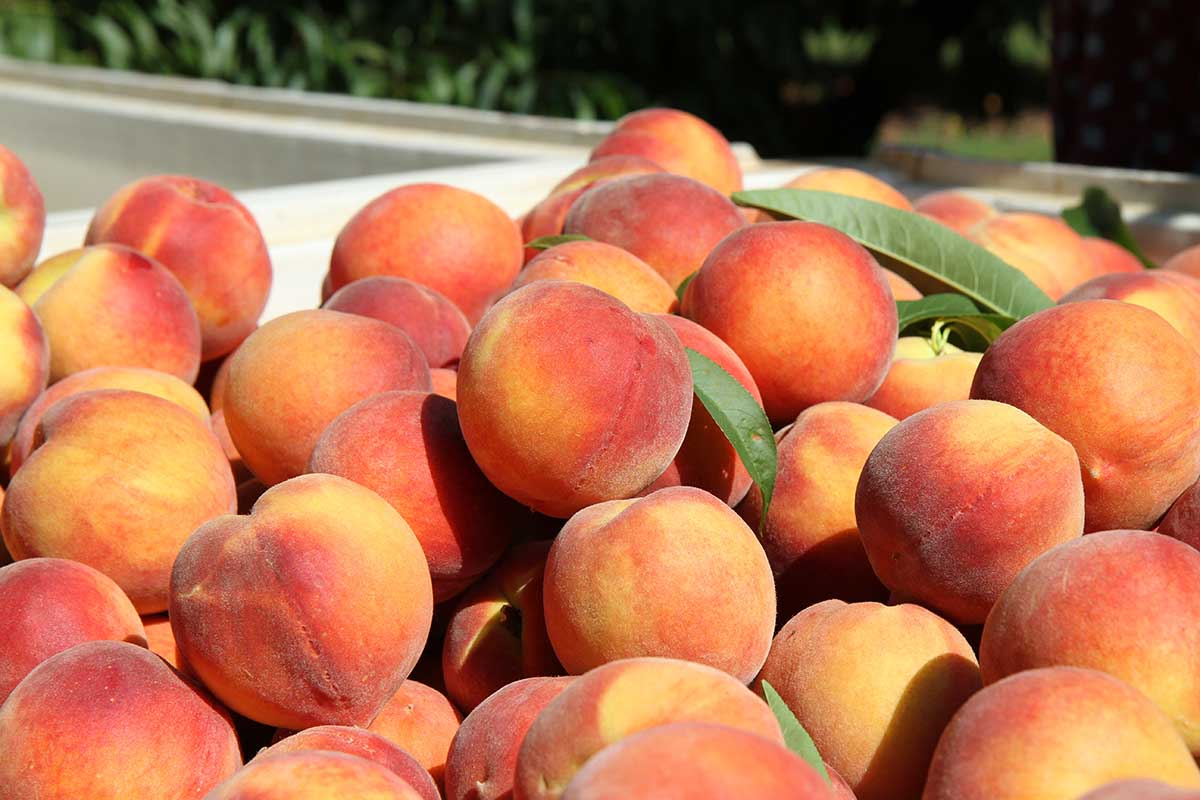 Following only California and Florida, Georgia is ranked third in overall fresh market and processing vegetable plantings, harvesting, production and value of production, according to the U.S. Department of Agriculture.
Following only California and Florida, Georgia is ranked third in overall fresh market and processing vegetable plantings, harvesting, production and value of production, according to the U.S. Department of Agriculture.
The state’s benefit is its dirt. “It’s our diversity of soil types,” says Will McGehee, partner with Genuine Georgia Group, which grows and markets peaches, pecans and apples from Fort Valley, GA. “Everything starts with the dirt. When we go from the North Georgia mountains through the Piedmont, where we are in the middle of the Georgia plateau, to the Georgia plain, we have three distinct soil types and growing climates. We are able to grow most every kind of tree, plant, root and tuber. It all has a place within our state boundaries. You can find it all right here. Having that diversity helps us.”
Georgia’s vegetable portfolio is vast and deep, and includes broccoli, cabbage, carrots, green onions, other sweet onions, potatoes, sweet potatoes, tomatoes, field peas, butter beans and a host of leafy greens. Greens include collards, kale, beets, spinach, Swiss chard, turnip, dandelion, Napa and flat cabbage and specialty greens.
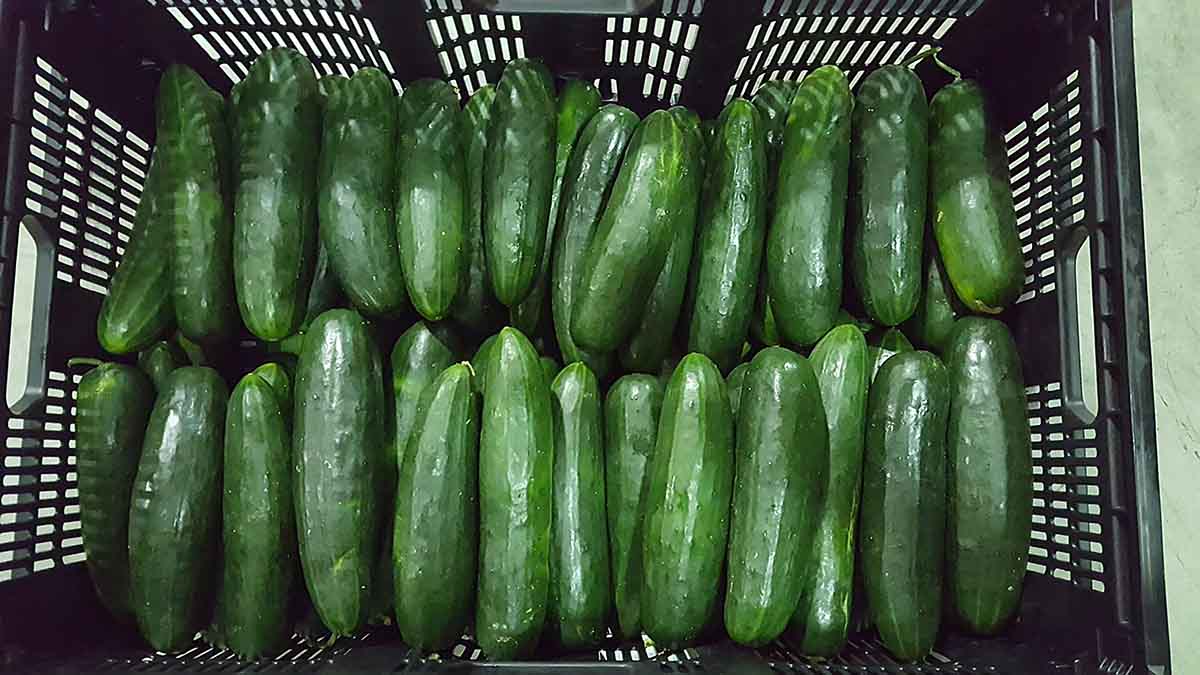
LARGE DIVERSITY HELPS RETAILERS, RESTAURANTS
“This is a very diverse state,” says Eric Bolesta, salesman with the Grower Network, LLC, formerly known as Ken Corbett Farms LLC, which grows and ships vegetables and citrus from Lake Park, GA. “This state has 350 to 400 miles from one end of the state to another. There are the mountain regions in the north all the way down to the coastal plains, which allow growers to grow numerous crops in the same state, similar to California.”
Retailers, including Publix Super Markets, Inc., based in Lakeland, FL, value Georgia’s contributions. “Over the years, both retailers and customers have come to enjoy the seasonal varieties and volumes of great-tasting, high-quality fruits and vegetables from Georgia,” says Maria Brous, director of media and community relations. “This rich history of quality, abundance and value from our Georgia growers is alive and well today.”

At 61 Main, in Jasper, GA, north of Atlanta, executive chef Jenna Schreiber loves to use Georgia Grown produce. “I always start with Georgia Grown,” she says. “If I get a list of produce from a supplier that highlights what’s from Georgia, I will always go there first, even if there’s a price difference. I have been very pleased with the quality. I think Georgia is kicking some butt. Shoppers and diners like to see the Georgia Grown product. It makes us proud of our state.”
The product variety helps wholesalers keep their retail customers stocked. “You have an array of fruits and veggies available, including peaches, strawberries and blueberries during the spring,” says Andrew Scott, director of marketing and business development for Atlanta wholesaler Nickey Gregory Co. LLC. “The climate with good chill hours at night is a plus.”
The state is a produce center. “South Georgia is the hub for diversification in Georgia agriculture,” says Samantha McLeod, executive director of the Georgia Pecan Growers Association (GPGA), which is headquartered in Tifton, GA. “In one field could be broccoli in the winter months and watermelons in the summer months. Across the road could be a 100- year-old pecan orchard in full production year after year. Georgia is a truly amazing state in the diverse range of specialty crops it grows.”
The Georgia Grown program is important to the locals and surrounding Southeastern states. “There are a lot of retailers in the Southeast that participate in promoting locally grown, and the support from consumers is amazing,” says Scott Norman, director of blackberry and rasp-berry product management for Salinas, CA’s Naturipe Farms LLC, which grows and ships in Georgia.
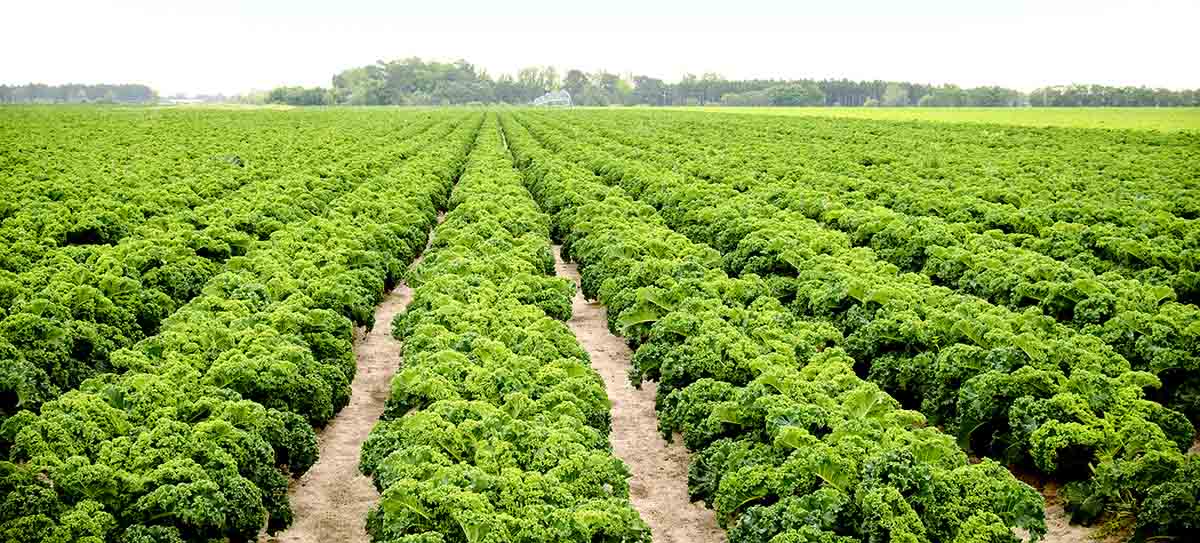
DIGGING FOR GOLD
Although Georgia doesn’t border the Gulf of Mexico, its close proximity is an advantage. In the winter, the warmth from the Gulf reduces severe freezes and allows year-round growing of items such as leafy greens. In the summer, the Gulf brings moisture that gives the state an edge by keeping temperatures from overheating, explains Heath Wetherington, general manager of Baker Farms LLC, in Norman Park, GA.
“We benefit from being in a great area that has great soil and a great climate,” says Wetherington. “We are kind of in the crossfire of some good moisture that comes across. This is one of the best places for an extended season of growing greens.”
Georgia and fresh are nearly synonymous. “When people think of Georgia Grown, they think of a fresh product,” says Bob Stafford, manager of the Vidalia, GA-based Vidalia Onion Committee. “The reputation continues to increase in buyers’ and shoppers’ minds.”
The variety of soil is crucial. “When you really think about it, terrain has a lot to do with what growers are able to grow,” says Bolesta. “Our sandy soils and heavy clay favors growing numerous items. The corn guys love the clay. The vegetable growers love the sand while the peach and apple growers in the northern part of the state enjoy the weather that’s typically cooler than in the South. It all helps Georgia’s production.”
Georgia Grown items go well together. “We encourage retailers to merchandise Georgia Grown products together and create a destination for their customers,” says John Shuman, president and chief executive of Shuman Farms, Inc., Reidsville, GA. “Georgia’s diverse, rich soil grows a variety of produce, and customers have learned to seek out the Georgia Grown logo on signage and products in stores. That’s why Shuman Farms makes sure that the Georgia Grown logo is on all of our RealSweet Vidalia packaging.”
Produce is grown throughout the state. “Geographically, Georgia is pretty unique,” says Wetherington. “We have peaches and pecans all the way down to the dry vegetables, squash and peppers, and then the leafy greens. There’s just a large array of commodities that are grown in Georgia.”
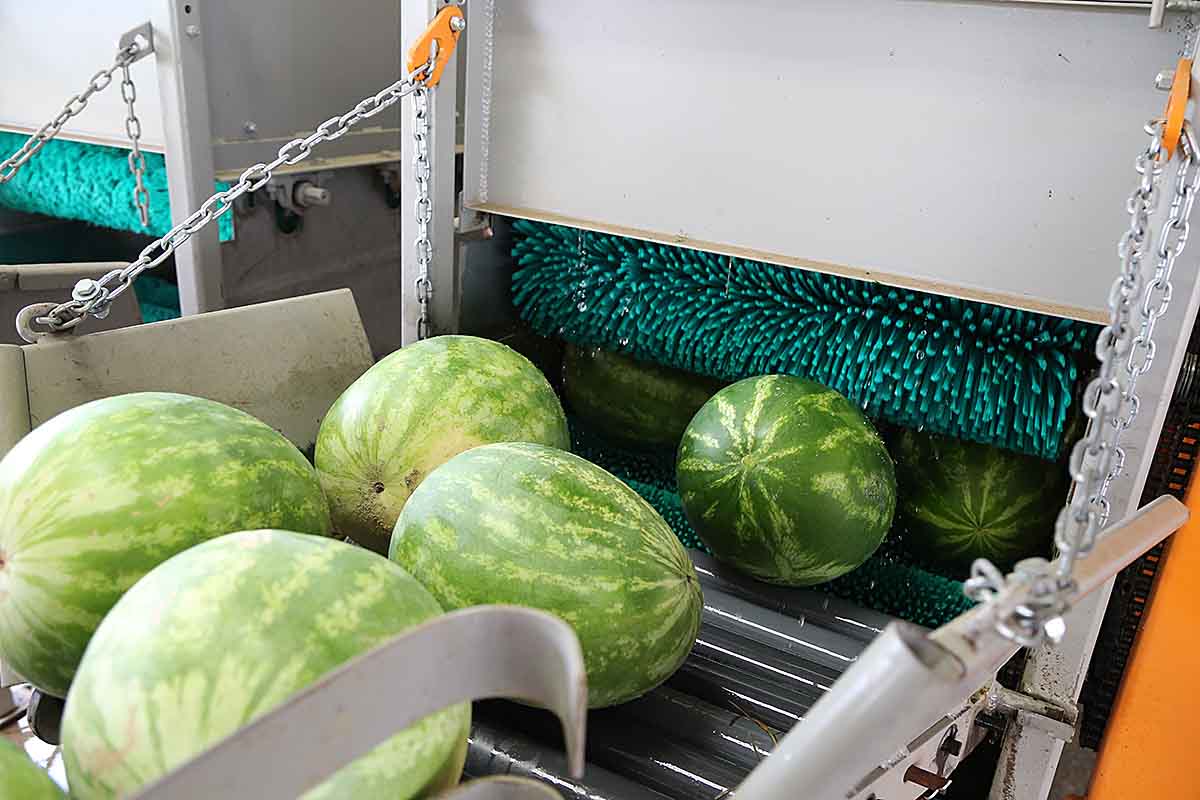
CONSISTENT QUALITY
The favorable growing conditions help produce quality products. “Georgia has really good land that is ideal for vegetables,” says Calvert Cullen, president of Cheriton, VA-based Northampton Growers Produce Sales, Inc., which grows and ships Southern vegetables, sweet corn and leafy greens throughout the East Coast. “The state has good soil types. The soil and the climate really help produce great vegetables.”
Agriculture is Georgia’s oldest and largest industry. Ag-related businesses are responsible for employing 1 in 7 Georgians, notes Jordan Carter, director of sales and marketing for Leger & Son, Inc. From Cordele, GA, Leger grows and ships watermelons from Eastern growing regions.
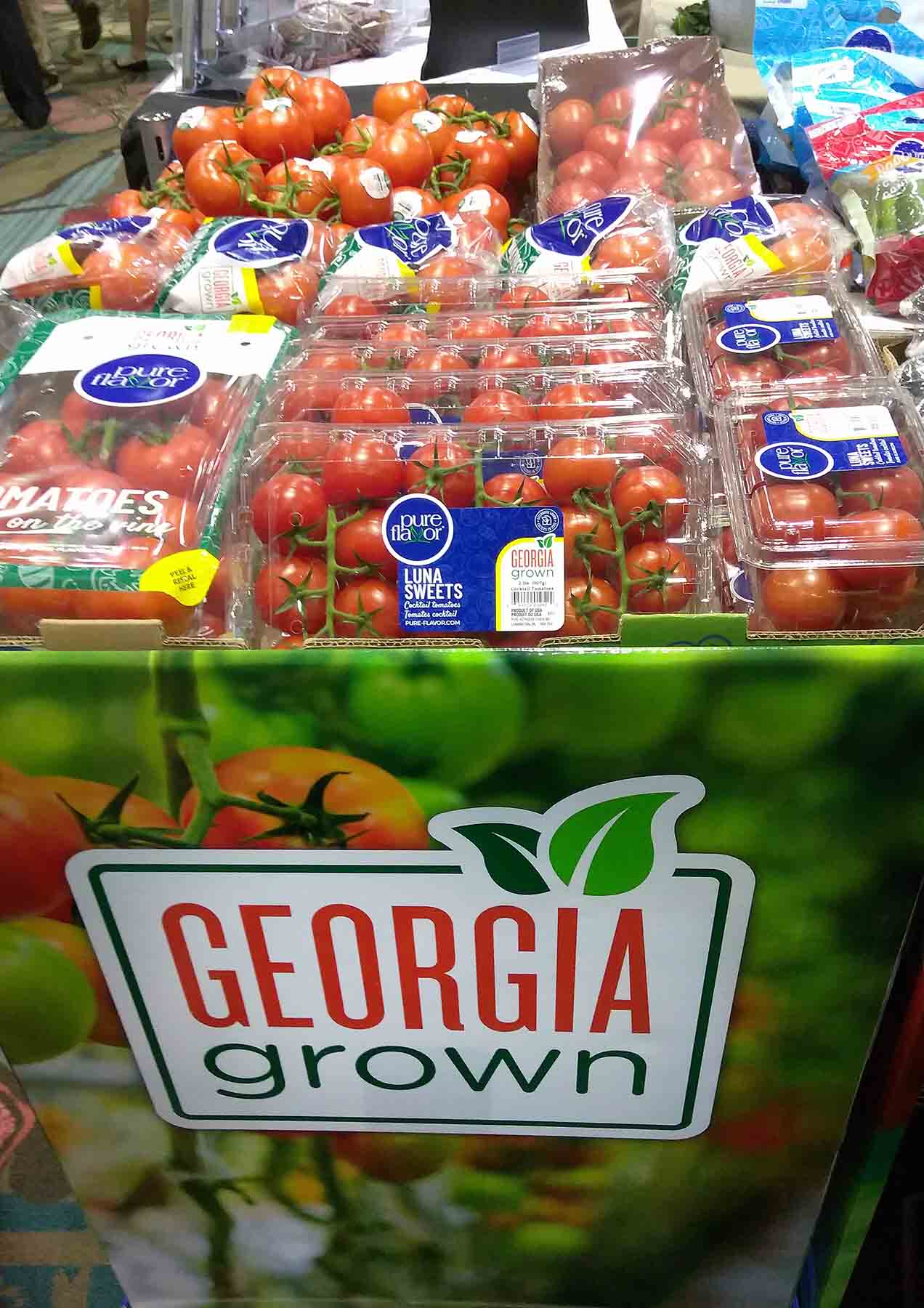 “Our climate and soil provide for fruitful growing conditions,” she says. “The Georgia Grown program is a statewide promoter of locally grown. It is designed to grow Georgia’s agricultural economies. The sale and purchase of locally grown continues to rise and is positively affecting Georgia’s economic impact.”
“Our climate and soil provide for fruitful growing conditions,” she says. “The Georgia Grown program is a statewide promoter of locally grown. It is designed to grow Georgia’s agricultural economies. The sale and purchase of locally grown continues to rise and is positively affecting Georgia’s economic impact.”
Wetherington notes how influential Georgia’s promotional efforts are. “The Georgia Grown program is a model that other states are standing up and taking notice of,” he says. “Georgia Grown has put all the state’s commodities under one roof and is encouraging people to request Georgia products.”
Georgia’s favorable climate helps the state produce its numerous fruits and vegetables. “We have a good climate, which helps us produce healthy and nutritious products,” says Charles Hall, executive director of the Georgia Fruit & Vegetable Growers Association (GFVGA), LaGrange, GA. “Generally, Mother Nature looks on our state favorably. While we’ve had some issues in the past, overall, our soil, moisture conditions and the weather are all positive in terms of growing produce.”
KEY WINDOW OF AVAILABILITY
Georgia’s marketing window is essential. “It keeps good products on the shelves,” says Hall. “We are early in the marketplace, during our late spring timeframe. It’s a good time for people to be buying fresh fruits and vegetables. Generally, fruits and vegetables on the marketplace will be fresh and will look and taste good.”
That window provides buyers a large assortment. “Georgia has a very diverse grower community,” says Ted Wanless, chief operating officer of SM Jones & Co., Inc., which grows and ships from South Georgia and Belle Glade, FL. “These growers possess experience growing multiple commodities.”
In the spring, East Coast vegetable production begins in South Florida and moves north. “Georgia is an important link in the chain,” says Delbert Bland, president of Bland Farms LLC, Glennville, GA. “Georgia is a vital part in the connection between Florida and that space going up the road, whether that be watermelons, sweet corn or sweet onions.”
In recent years, Georgia has become one of the largest fresh blueberry production states. The state’s extensive production window supplies blueberries from early April through late June. “Georgia is the largest producer of blueberries in the Southeast,” says Mario Flores, Naturipe Farms’ director of blueberry product management. “It is the first major production region that can supply much of the eastern United States. There are tremendous promotional opportunities in late April through May as well as early through mid-June.”
Water is one of the main nutrients for pecan production. “Georgia is blessed with water,” says GPGA’s McLeod. “Georgia also has the appropriate amount of freeze required during the trees’ dormancy, and the warm climate and sunshine are also key to pecan production.” The climate helps produce pecan varieties sought after by the baking and snack food markets, because they possess higher oil content and are larger, with more golden color, she says.
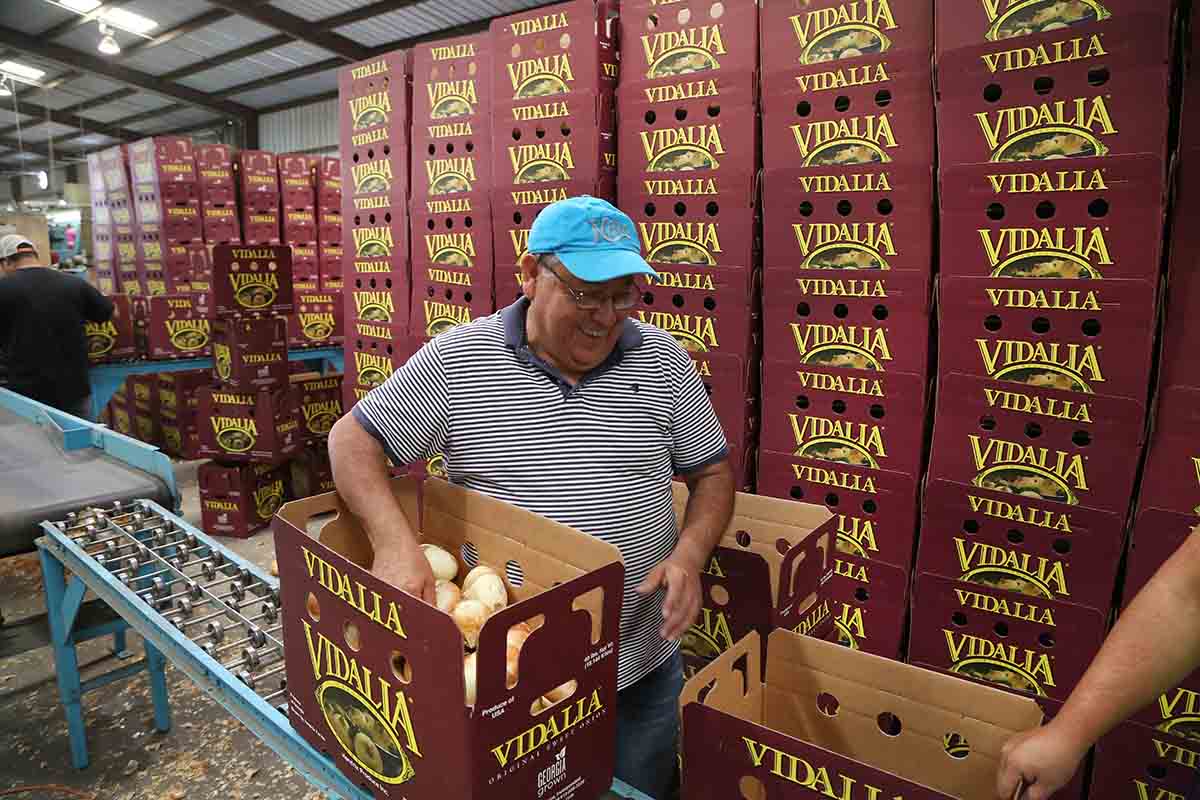
PERFECT TIMING
Timing is everything. “The Georgia window fills the key gaps between Florida’s production and also Mexico’s production coming out of the winter and spring,” says Grower Network’s Bolesta. “There aren’t really many options during that time,” he says. “Georgia is a big producer then. It fills the need.”
Most of Georgia’s produce is shipped to East Coast customers and into the Midwest, with about 10 percent crossing into Canada. “When you say Georgia Grown or products grown in Georgia, consumers in New York may not think of that as ‘local,’ but they know the products are being grown on a family farm and in a good environment where they have not had to travel far,” says Hall.
In terms of geography, Georgia is favored by a strong interstate highway network, which allows for efficient logistics. “Via I-75 and I-95, Georgia is a perfect hub,” says Northampton’s Cullen. “If you look on the map, one can go from Georgia all the way to Miami in seven hours, the same going west to Mississippi and Louisiana. It’s a central hub, and it’s why the state has done so well.”
Georgia is located in a highly favorable area. “From a logistics perspective, you can deliver to more than half the U.S. population within two days from South Georgia’s growing region,” says Nickey Gregory’s Scott. “This gives you fresher product and quicker turns on your Eastern vegetables program. Also, the climate in South Georgia during the spring harvest is ideal for Eastern veg until the summer heat hits.”
SAME-DAY SERVICE
Georgia growers can make same-day deliveries to customers in Birmingham, AL, Charlotte, Nashville and Orlando, FL, and ship product within two days to Maine, Minneapolis-St. Paul and West Texas. “Being so close to the markets on the East Coast is what helps us sell it,” says Genuine Georgia’s McGehee. “It’s one thing to be able to grow produce with great flavor. That’s where we hang our hat, as our soil and climate give us the best flavor. You also have to be able to deliver that flavor. The fact we are close allows us to focus on that flavor. We don’t have to worry about five-six-seven-day truck rides. We are a two- to three- day drive for everyone who lives on this half of the country.”
Sweet corn is one of the state’s major vegetables. “Georgia is a huge transitional state for sweet corn from Florida and is also returning in the fall from northern states,” says SM Jones’ Wanless. “The climate lends itself to seamless supplies under normal weather circumstances.
Once Florida finishes, the Midwest is not generally ready for corn, so Georgia is the go-to state for Southeastern and Northeastern retailers.”
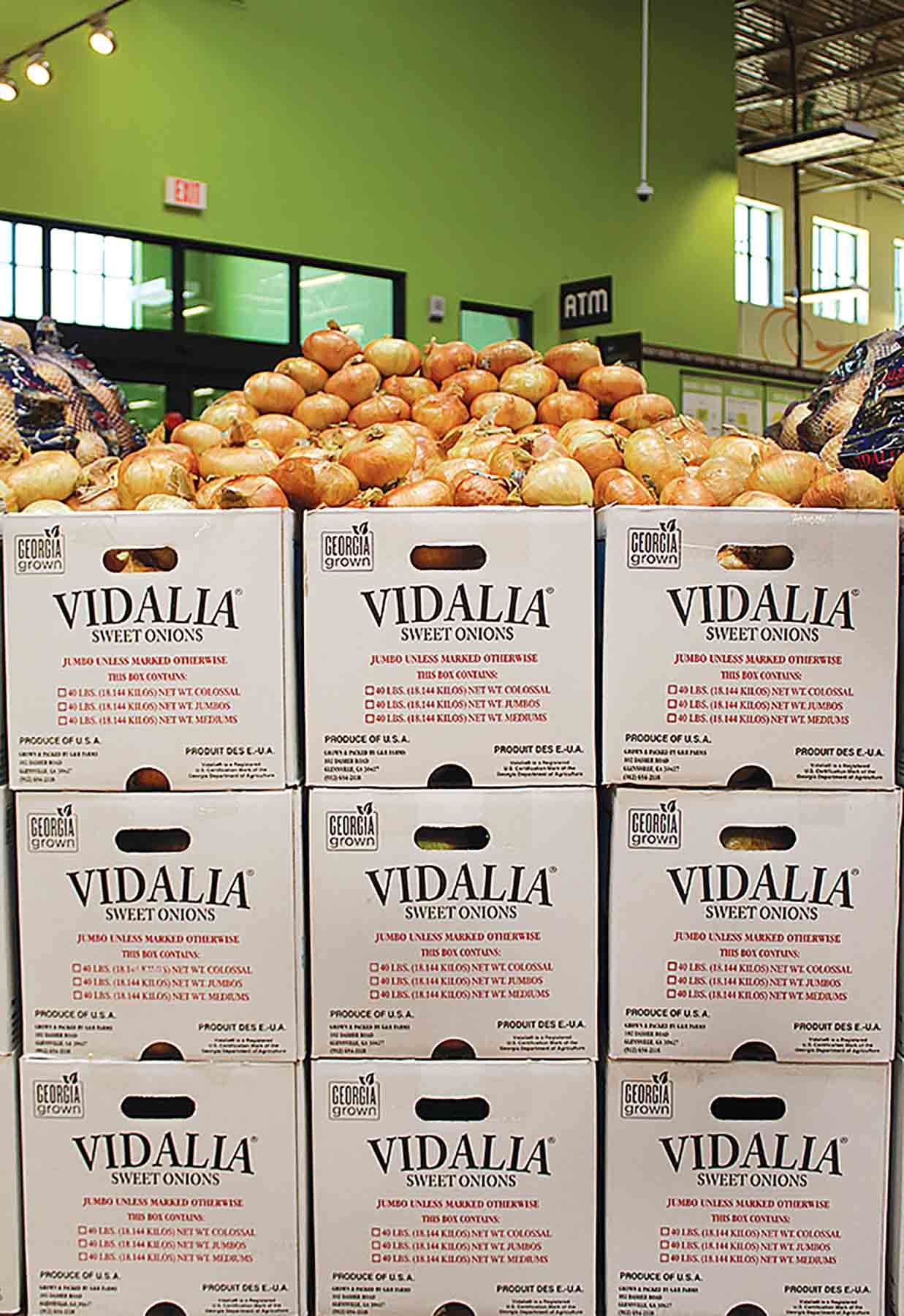 As the state’s signature vegetable, Vidalia onions are a big part of Georgia’s vegetable shipments. “The Vidalia onion is one of many fruits and vegetables that makes up Georgia’s agricultural landscape,” says Shuman Farms’ Shuman. “Many of the items grown in Georgia, like the Vidalia onion, are special and unique. When customers see the Georgia Grown logo, it lets them know their produce is going to be delicious and peak of the season.”
As the state’s signature vegetable, Vidalia onions are a big part of Georgia’s vegetable shipments. “The Vidalia onion is one of many fruits and vegetables that makes up Georgia’s agricultural landscape,” says Shuman Farms’ Shuman. “Many of the items grown in Georgia, like the Vidalia onion, are special and unique. When customers see the Georgia Grown logo, it lets them know their produce is going to be delicious and peak of the season.”
Georgia’s image is solid. “Georgia Grown has been a very good promotional brand for our growers as well as for our national marketing partners,” says Hall. “We hope we bring an image of good quality products that are nutritious and fairly local grown.”
Georgia’s reputatπion in produce remains stellar. “Georgia Grown has kept building on its momentum,” says Bland. “It’s never been to a point where it’s considered anything but good, local produce. It keeps building on that. Quality is always excellent because of it being fresh. People will naturally do a good job if it’s their livelihood. The more volume we do, the more attention we get. What has made it continually expand in the eyes of the world is the availability and consistency. Everything in general points to Georgia having a more enhanced reputation for vegetables in the South.”
New Georgia Commodities Keep Retailers Supplied
Georgia growers continually invest in varietal improvements, seek new commodities to grow and make other improvements, including new packaging to help their retail and wholesale customers sell more products.
“Georgia is always on the front edge of new agricultural products,” says Matthew Kulinski, deputy director of marketing for the Georgia Department of Agriculture. “New crops in Georgia include citrus, olives, pomegranates and ginger.”
This fall, the Lake Park, GA-based Grower Network, LLC, formerly Ken Corbett Farms LLC, plans to increase harvesting of satsuma oranges. The grower-shipper first planted satsuma trees in 2012, and for the past two years, has been harvesting and shipping fruit. The Grower Network plans to install a packing line before harvesting begins in mid-October. Production typically ends by mid-January. Eric Bolesta, salesman, says the company expects to harvest 800,000 pounds from its South Georgia groves.
“This will be our biggest season yet,” he says. “There are plenty of people putting in trials, but we are in it to win it. This will really help retailers. The more exposure the state can have on different items, the better, and the more relevant [a grower-shipper] becomes. It’s staying in front of the customer. It doesn’t matter the item as long as you stay relevant.”
New varieties are helping Salinas, CA-based Naturipe Farms LLC’s Georgia blueberry production. “We have new proprietary blueberry varieties starting to produce in Georgia as well as some of the latest releases of public varieties that continue to advance our position,” says Mario Flores, director of blueberry product management. “Organic blueberry production in Georgia has more than doubled in the past three years. We continue to see this trend on incremental growth of volume.”
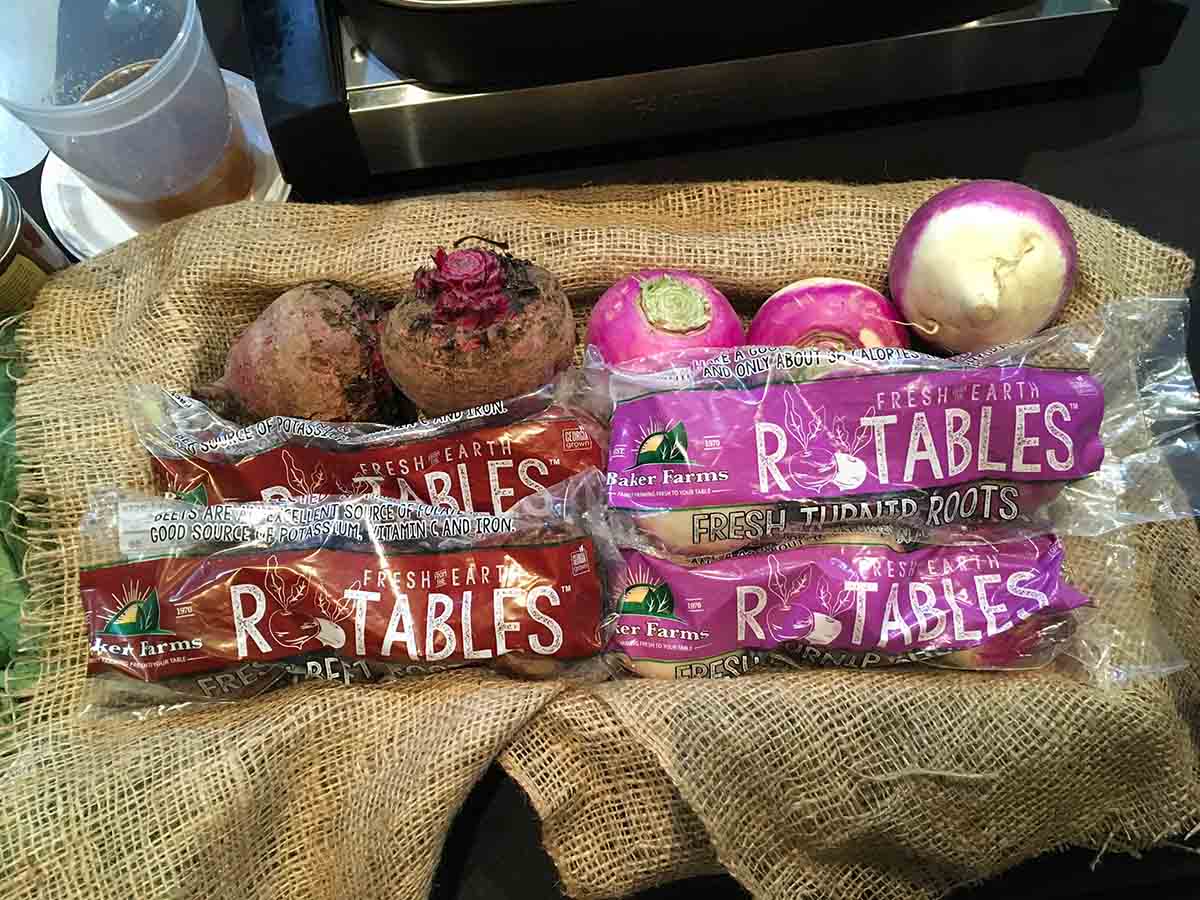
Baker Farms LLC, a Norman Park, GA-based grower-shipper of leafy greens and other vegetables, is marketing its roots in new packaging. The company has introduced 1-pound serving-sized bags of Rootables, prepackaged and washed turnips and beet roots.
In the past, beets and turnips were sold in 25-pound containers, which necessitated repackaging by grocers. As the product is washed and packaged on the farm, the new packaging reduces handling.
“This is a really convenient product for the consumer who is asking for these kinds of vegetables,” says Heath Wetherington, general manager. “People who never really thought they liked beets and turnips are now trying recipes on the grill.”
Leger & Son, Inc., Cordele, GA, has restored space once used for pecan production to provide additional watermelon cooling. “The renovation guarantees extended shelf life and main-tains quality for our customers and consumers,” says Jordan Carter, director of sales and marketing. “We are also working with processors. Fresh-cut is a thriving market and is only getting larger. We are really excited about the move forward.”
GDA Recognized For Character, Quality
Last summer, the Association of Food and Drug Officials awarded Georgia Department of Agriculture’s food safety division the Elliot O. Grosvenor Food Safety Award. The award recognizes leaders who best display improvement, innovation or sustained high performance within a food safety program. The GDA was recognized for making “tremendous strides in building a high-quality regulatory program that is organized, focused and accountable.”
The award is a big accomplishment for the GDA, says Heath Wetherington, general manager of Baker Farms LLC, in Norman Park, GA. “The Georgia Grown logo communicates to the consumer a highest quality product produced to the highest standards, that all the food safety standards have been adhered to in order to display that Georgia Grown logo,” he says. “It says a lot toward everyone’s commitment to making sure when consumers ask where their food is coming from, they have confidence. People want to know where their food is coming from and want to know what they’re eating. They want to know what practices are being used, what food safety standards are being met.”
The Georgia Grown program successfully promotes Georgia’s variety of produce. “Georgia Grown has become an exciting and essential marketing tool for suppliers and retailers,” says Jordan Carter, director of sales and marketing for Leger & Sons, Inc. in Cordale, GA. “Today’s consumer is contemporary. Transparency matters. The consumer can actually see the benefits of buying local quality produce while supporting local businesses. It’s a two-fer.”
Georgia’s brand gets noticed, says Wetherington. “They call for it and prefer
it because of the confidence they have in what goes into being a Georgia Grown member.”
Georgia Grown Produce Vital In Keeping The Peach State’s Stores, Restaurants Supplied
Georgia Grown produce is important to retailers and restaurants doing business in the state.
Georgia produce helps fill shopping carts at Publix Super Markets, Inc.’s Georgia stores. Of the Lakeland, FL-based chain’s 1,215 Southeastern stores, Publix operates 186 in Georgia. It also transports product to stores through distribution facilities in Jacksonville, FL, and Dacula, GA, on the northeast side of the Atlanta metropolitan area.
“The Georgia production of various commodities, such as tomatoes, peaches, peanuts, pecans, beans, squash and onions, to name a few, is critical to keeping our pipeline of fresh local fruits and vegetable full and fresh,” says Maria Brous, Publix’s director of media and community relations. “These products as a whole make up a significant part of our overall sales during this period of time.”
Publix’s customers eagerly await the start of Georgia products, including its peaches and Vidalia onions. “As a retailer operating in the Southeast and especially the state of Georgia, we understand our customers’ familiarity and desire for the seasonal commodities Georgia produces from mid-spring through the summer months,” says Brous. “This time of year is highly anticipated by both the retailers and the customers.”
Retail chains operating in the South must, by definition, offer the South’s abundance of produce. “Today more than ever, ‘fresh produce’ is a primary reason customers say they shop at one retailer vs. another,” says Brous. “ ‘Locally grown’ is also an important attribute our customers are looking for. So, to be able to combine both attributes of ‘local’ and ‘fresh’ seems like a no-brainer for us. Offering Georgia Grown produce is the best way to meet our customers desire for both.”
Local produce has long been popular at Swainsboro, GA-based Pinetucky Country Meats, which recently purchased a Piglet Supermarket in the south-central Georgia Vidalia region.
“Customers appreciate Georgia Grown produce,” says Ricky Reese, the store’s longtime produce manager. “They know Georgia Grown is top quality, especially the watermelons and Vidalia onions. You can’t hardly beat it.”
Georgia produce has been a major item of the store for decades. “Anytime you get local produce, it’s fresher because it doesn’t have so far to travel,” says Reese. “We buy a lot of local products. People come in here selling Vidalia onions, squash and sweet corn. They would prefer Georgia produce. That way, they know where it’s coming from.”

Georgia Grown produce helps the state’s restaurants develop sumptuous menu offerings. Local produce and other fruit, vegetables and nuts from throughout The Peach State are an important ingredient at 61 Main in Jasper, GA. The northern Georgia restaurant is run by executive chef Jenna Schreiber and her husband, Tadd Schreiber.
“We try to keep our focus on local as much as possible,” she says. “It only makes sense to support local farmers and what they’re already producing.” The restaurant reaches beyond its county to growers throughout the state, and sources a variety of products, including pecans. “It only makes sense to do it that way,” says Schreiber. “It was the logical decision when we first started, and local has become more evident. It’s great seeing that it’s now kind of the norm.”
In 2007, the veterans of the Charleston, SC, restaurant scene relocated to northern Georgia. When Schreiber first visited a local farmers market and inquired about growers supplying their restaurant, people thought she was crazy. Growers didn’t think their operations could supply enough products. However, close working relationships with the growers developed into something big.
61 Main serves dishes using many local items, including hydroponically grown lettuce, herbs, kale and pecans from Circle A Farms in Cumming, GA, for its salads, sandwiches and Caesar wraps. Mercier Orchards in Blue Ridge, GA, provides apples. The restaurant repurposes the local tomatoes it uses in its dishes, forming scraps into a jam for serving in fresh pesto sandwiches. “Over the years, we’ve learned how we can utilize what is abundant,” says Schreiber.
“I am more inspired by what shows up in my kitchen than trying to ask people to grow me specific things,” she says. “It’s more inspirational to me. If someone shows me a list to pick from, it’s like nah. But if they bring me two crates of kohlrabi, then I’m inspired. To me, it’s my responsibility to utilize it.”
Weekdays, the restaurant is open for lunch and on Saturdays, serves brunch from 9 a.m. to 3 p.m. The brunch relies heavily on Georgia produce, eggs and proteins. Monday is the only night it serves supper. “Diners appreciate local,” says Schreiber. “There’s a much higher level of interest. Local is becoming: ‘if you don’t do it, it’s more of the ‘wow, why wouldn’t you?’.”
2 of 17 article in Produce Business July 2019


